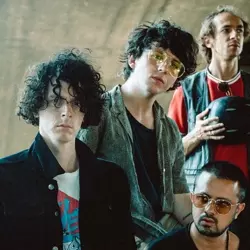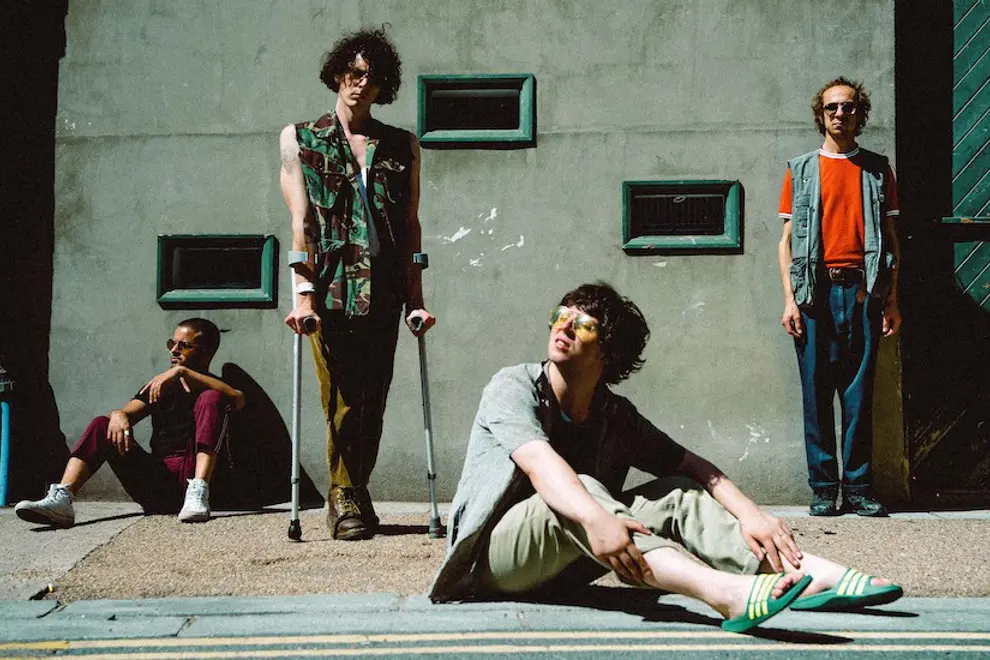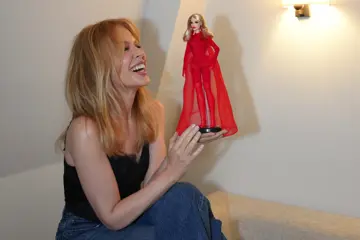 Mystery Jets
Mystery Jets“There’s a lot to dive into on this record…” is how I begin my conversation with Blaine Harrison, and while a statement such as that could relate to many albums, it certainly rings true for Mystery Jets - the UK indie-rock band that Blaine fronts - and their sixth album, A Billion Heartbeats.
A Billion Heartbeats has had a long journey to release. Initially, it was due for release in late-September last year, with the album roll-out going as far as week-of feature profiles and early, glowing reviews. Then, Blaine - who was born with spina bifida - had to undergo emergency surgery to “halt an infection close to my bone from spreading around my body." The band postponed the album release to early-April, unbeknownst to them that at that point, the UK would be grappling with a growing COVID-19 pandemic that would hospitalise 16,000 Brits (so far, and including their Prime Minister) and jeopardise the physical music market, delaying the physical album release until at least June, and pushing their already-delayed album tour to November.
The delayed release of A Billion Heartbeats isn’t the only way the record is densely complex, however. It’s an album fuelled by passion and frustration, born out of protest and socio-political movements that Blaine was caught in the middle of, living just off Trafalgar Square - the London hotspot that was ground zero for many of these protests, from Black Lives Matter to anti-Brexit ‘Remain’ marches. “In the space of six months it was Black Lives Matter, the huge ‘Our NHS’ march, Unite for Europe. Then, the solidarity sleep-out organised by Help Refugees, where we slept in Whitehall for the night... The protestors would wake me up in the morning. I’d just walk down and join in,” Blaine recalls.
At its surface, A Billion Heartbeats captures the rushing emotion behind protests; the frustration and anger translated through a heavier direction for the group when placed comparatively to their past records. A Billion Heartbeats crunches (rather than bites) and there’s a heavier emphasis on this raw ‘authenticity’ to rock music - the album-opening Screwdriver feels reminiscent of the grand, anthemic rock of bands like Kasabian at their most lively - that feels like a parallel to the raw emotion that powers protest, and the loudness that it can bring.
Don't miss a beat with our FREE daily newsletter
Go deeper, however, and you’ll find that this sense of resistance and protest influences the album many other ways than just sonically. In its lyrics, Screwdriver speaks of the rise of the UK alt-right (“Hate masquerading as pride / Say you got God on your side, but you ain't why Jesus died,” Blaine near-yells), while History Has Its Eyes On You was born through the 2017 Women’s Marches, which saw 100,000 people descend on Trafalgar Square the day following Donald Trump’s inauguration as United States President. Wrong Side Of The Tracks, the album’s closing track, is influenced by the next generation of protests, especially Greta Thunberg’s climate marches: “Even if they say we were born on the wrong side of the tracks/ Don't look back 'cause that's not where it's at,” he sings.
However, one song from the album that feels particularly potent, especially in today’s world, is Hospital Radio. Written amongst a sense of fear towards the future of Britain’s NHS (the public-funded UK healthcare system that like Medicare in Australia, is constantly in discussion of being privatised), Hospital Radio has almost taken on new meaning considering the climate the album is released among; its message a “wake up!” moment for those that have been taking the service for granted in the past. Throughout the COVID-19 crisis, the UK public have applauded and celebrated the NHS for their efforts, but when this is over and the NHS is once again at threat of privatisation, will those people fight for its future?
That’s a question posed across much of A Billion Heartbeats, and not always in relation to the NHS, like on Hospital Radio. There’s plenty to fight about in 2020, and A Billion Heartbeats isn’t an album to demand your action or tell you what to fight for. Instead, it’s an album that reflects a growing frustration particularly amongst minorities and youth, and lets the world know that sure, music can be louder than words in protest, but how about when that music is built from the words themselves?

I want to start this where the album itself started, which was amongst this protest culture that was happening while you were living nearby Trafalgar Square. Was there a certain point where you were like "Okay, this is the energy I want the album to channel?"
I don't think I ever really go into a writing situation knowing exactly what I'm trying to say, I don't have an ability to see into the future - I wish I did because I could have seen that would have helped in this situation that we're in now - but A Billion Heartbeats was quite an exception, because the situation you described, which is this abandoned building which I was living in just off Trafalgar Square during the period of 2017 to the beginning of 2019, I saw exactly what record I needed to write. That's never really happened to me before because I think it was being in that space and starting to see these protests take part literally on my front steps, outside my front window, coming down to the square.
On the first Saturday I lived there, there was a protest against the rising alt-right movement in the UK. There was a rising spike of race-related crime in the UK, really after the EU referendum that we had after the to leave Europe, because I think a lot of people who perhaps harboured xenophobic views felt they could sort of come out of where they've been hiding under. In that post-referendum environment, those views were becoming more and more palpable in society; there was a sort of rising antagonism and polarity in culture and it wasn'tjust race-related, it was all political.
Living where I lived, it felt like such a boiling pot of people coming past my window, and a pot of the biggest conversations going on in society. At that time, I think songwriters were often quite afraid of being political, just because of the justifiable fear of alienating audiences and I was the same as well - like, labels want a record that charts, they want that nice gold disc on the wall and they want something that will go on the radio. Writing angry songs about what's going on in society isn't necessarily gonna put you in those places, but I think it really struck me.
I think music has a responsibility to comment on what's going on right now, and I think actually historically, stuff like British punk was really a product of what was going on in the youth. If you want to know what it felt like living in the UK in the 1980s, for example, listen to Joy Division. I think music has such a palette to capture the mood and the spirit of the time that we're living in, and I felt that while I wanted to do that with our music, I could tell from looking outside my window that I don't need music to tell me what's going on in the world. I think music is very good at providing a kind of escape from the harsh realities of life. Music can provide escapism, but I think also some music can actually comment on the times that we're living in, and I wanted to do a bit of both.
A Billion Heartbeats, the song, is definitely one that seems to encapsulate this whole record, and lyrics like "We only feel the life in our limbs and our heartbeat beneath the skin when time is running out" captures that energy. Do you feel the same way?
Yeah, I think it does in a way. That line is an interesting one, because just now, that made me think about the time we're currently living in. A cynic could say "Well, the songs don't feel relevant because the most important thing right now is just thinking about our daily lives and how to get through the chaos that the COVID-19 pandemic brought upon the world." But actually, I looked around me and I see that in the past two weeks, air pollutions cleared up, universal basic income has been proposed by conservative governments, we're paying more attention to our bodies and to our mental health, and we're connecting more with our communities. Actually, we're starting to see the world around us and I think so many of these systems have been instrumental in bringing us to where we are. To go the consumer capitalism or globalization route, look at the corporate industry. So many of these systems are responsible for the place we've ended up in, and a lot of that machinery and the cogs in that corporate global machine have ground to a halt - and hey, guess what? Emissions have gone down.
Perhaps this is the universe sending us to our bedrooms to think about what we've done. Not wanting to sound too 'New Age' about it, but I think this is maybe just a chance for us all to just experience what's important and feeding our families and speaking to our loved ones. Music is such an important part of that, like I got my record player out the other day and I've actually taken the time to listen to albums. I've taken in so much enjoyment and relating that back to the lyric, why does it take a situation like this to bring out the best in us? It's almost criminal that it does take this to just remind them what's important in our lives.
I think that carries over into Australia as well, and there's a similar thing happening here too. Like you were saying, the government have suddenly become receptive to things people have been pushing for years: wage subsidies for recently-unemployed, increases to welfare payments, funding for Medicare in Australia and in the UK, the same with NHS. The government has always been able to do this, it's just taken everything for them to do it.
I think that's a really good point. The other week, we had a day where the whole country gave a minute of applause for the NHS frontline workers in the UK... I say a minute but it was more like half an hour of continuous clapping and applause. It was incredible. I've never taken the NHS for granted; I've got a disability, so I've spent quite a large amount of my life like getting stitched up and having operations, so I'm handled by the NHS. It just felt like... it was so emotional to see everyone just come to their windows and balconies, and it was quite overwhelming and I think the government has really had to listen to that. Having got sick on both sides of the Atlantic and experience what it means to be unwell in America, I had to fly home from a tour in America to get treatment in the UK because it was cheaper than getting private health in America.
I just couldn't I couldn't sing the praises of the NHS loudly enough really.
It's interesting how you were saying that cynics could tell you that music doesn't matter at the moment, but with a song like Hospital Radio, it almost feels like to have taken on an entirely new meaning and power with everything going on. How has your attitudes and relationship with some of the tracks changed considering the climate it's being released amongst?
In a normal album cycle, I guess we spend time away from it all. We make the record, and then we put the record out into the world, and we tour and the songs take on a life of their own. But with this record, just as we were about to release it, I went into the hospital and had to take three months off in isolation. That was the end of last year, and then we push back to April, and just as we're about to release it, the rest of the world is in isolation, and in quarantine. It's sort of been conceived, made and released into the void, which is very difficult for us. The context of a song changes a lot when you play it live, and we haven't had the chance to do that. Obviously we've got the internet and the internet responds in different ways to different things you put into it, but I think it won't really be until we're out playing shows that we'll see that relationship change a lot more.
I feel like a lot of 'protest music' is quite heavy, and built off emotions of anger, fear and frustration. This album covers a lot of that, being reflective of people's attitudes in protest, but at the same time, I think it's contrasted with a sense of hope and upliftingness, which is something that comes alongside fear and anger, but is often not looked upon in music built from these emotions. Do you feel like there's an important balance to have there?
I think there probably is. I didn't really feel that connected to politics prior to making the record, and I think one of the reasons for that is that I looked at the elections, it just felt like a popularity contest, like football. Politics, to me, just felt like a battle of popularity, and which side had more fight and power in them. I think that when that changed for me, was when I started going to protests because I actually realized that it's actually about people, and experiences about the suffering that people from different backgrounds are experiencing, particularly somewhere like the UK, where there is still such a huge spectrum of classes.
When you go to a protest, you realise that we can stand side by side with someone from a completely different background - a complete different privilege to us - and we can actually still agree about something, and that's probably because there are things which transcend politics - human values. I think those are the things which I emotionally connect with and the things that I feel that I want to fight for in my music. Some of those things have definitely come from a place of anger, and I think when I see racial intolerance or when I see people being marginalized and voices being marginalized from society it makes me angry, and that's something that I want to fight for.
In saying that, I also recognize that music has the ability to lift people and it has the ability to inspire. I think in a way it needs to do both, because as much as I want to talk about the mechanics of society in my music, I also want people to feel a sense of hope, because I think that whenever anyone goes to a festival or goes to their record player, it's not like picking up a newspaper - you go there to kind of be consoled or to escape or feel like you're somewhere that you can channel the things that you're feeling, and I think one of those things needs to be hope, because I think without hope, it's a hopeless situation... obviously.
There's a lot packed into this record, both from your perspective and the perspective of the people this album is influenced by. What do you want people to take away from it?
I think we just want to be part of the conversation, and I look at our conversation around the NHS, for example. The NHS has been all I think about a lot of the time, and the way that the conversation around mental health has hugely changed over the last few years. I think seeing artists coming forward and saying, "You know what? I feel these things too, and I suffer from the same things as you." I think it humanizes it. They're things which affect all of us, and I think I want our music to make people feel better about whatever's going on, whatever they're feeling angry about or alienated from. Music is there for you, and it's got your back. I think that's what we've always tried to do with our music.
Mystery Jets' sixth album, A Billion Heartbeats, is out now digitally via Caroline Australia.
Follow Mystery Jets: FACEBOOK

















